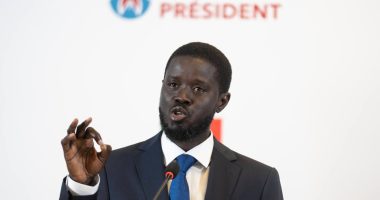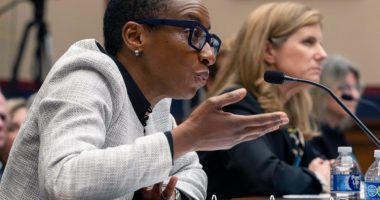Unlock the Editor’s Digest for free
Roula Khalaf, Editor of the FT, selects her favourite stories in this weekly newsletter.
Rishi Sunak has pledged to lift UK defence spending to 2.5 per cent of gross domestic product by the end of the decade and said Britain’s European allies should follow suit because the world is in its most dangerous state since the end of the cold war.
The pledge would mean defence spending rising gradually from 2.32 per cent of GDP to 2.5 per cent by 2030, well above Nato’s 2 per cent defence spending target.
The UK prime minister made the announcement at a joint press conference in Warsaw on Tuesday with Jens Stoltenberg, Nato secretary-general. Sunak conceded that the world’s attention had been on the crisis in the Middle East but said the west could “not lose sight” of Russian aggression on European soil.
Sunak said the UK was not on the brink of war but it was a sensible precaution to boost defence spending and put the defence industry on a “war footing”.
“As Churchill said, in 1934: ‘To urge the preparation of defence is not to assert the imminence of war. On the contrary, if war were imminent, preparations for defence would be too late’,” he said.
The opposition Labour party, which is leading in the opinion polls ahead of the upcoming general election, has vowed to lift defence spending to 2.5 per cent of GDP only “as soon as resources allow”.
John Healey, Labour shadow defence secretary, said: “As Keir Starmer recently set out, Labour wants to see a fully funded plan to reach 2.5 per cent, but the Tories have shown time and time again that they cannot be trusted on defence and we will examine the detail of their announcement closely.”
Healey said a Labour government would conduct a strategic defence and security review in its first year. “The British public will judge ministers by what they do, not what they say.”
Sunak has faced months of demands from some of his own Conservative MPs, including defence secretary Grant Shapps, to lift military spending further to counter the threat from Russia.
He said the promised spending increase, made despite severe constraints on the public finances, was the “biggest strengthening of our national defence in a generation”.
At the same time, Sunak lifted UK military aid to Ukraine to £3bn for the current financial year, saying this would be the minimum annual baseline for future gifts to Kyiv if its war with Russia continued. That would imply £18bn of military aid between now and the end of the decade.
“Today we accompany that long-term security agreement [with Kyiv] with a long-term funding agreement as we commit to provide at least the same level for the rest of the decade, or as long as required,” said Sunak.
Parliament’s public accounts committee warned last month that the Ministry of Defence had a £17bn gap in its plans to equip the military over the next 10 years.
Shapps has said the extra spending will be used to focus on important high-tech capabilities, such as air defence missiles and British production of 155mm artillery ammunition.
The commitment would mean UK defence spending rising from £64.6bn this year to £78.2bn by 2028-29, with a sharp rise to £87bn by 2030-31 at which point the 2.5 per cent ratio would be hit.
Officials said that defence spending would have been closer to £80bn — about £7bn less — if it was kept at the current 2.3 per cent of GDP.
On Wednesday, Sunak will meet Olaf Scholz, chancellor of Germany, which is spending 2 per cent of its GDP on defence this year.
Professor Malcolm Chalmers, deputy director-general of the Royal United Services Institute think-tank, said: “The Germans got under the UK government’s skin. Germany was going to be spending more on defence than the UK [in cash terms]. That’s been quite a powerful factor because we’re used to this image of ourselves as the leading military power in Europe.
“Without this increase, in [cash] spending terms that would no longer have been true,” he added.
The UK prime minister announced overnight that Britain would give a further £500mn of military assistance to Ukraine in this financial year, taking the total to £3bn.
Also on Tuesday, Sunak appointed the vice-chief of the defence staff General Gwyn Jenkins as his new national security adviser.
He announced the appointment after the Financial Times reported that Sir Tim Barrow, who has held the role since 2022, would become the next UK ambassador to the US.
Barrow’s move has angered Labour, which has argued that the decision over the most senior posting in the British diplomatic service should have been left until after the election expected this year.
Dame Karen Pierce, current UK ambassador to the US, will remain in post until the end of the year before handing over to Barrow, according to officials.
On his way to Warsaw, Sunak told reporters on Tuesday: “The ambassadorial or diplomatic appointments are always made in the usual way, which they will be.”

He added it was “entirely keeping with precedent because ambassadors-designate often go and acclimatise themselves and build relationships before they formally start”.
Sunak said the appointment of Jenkins marked the first time that a military officer had filled the role of national security adviser. He will take up the post in the summer.
Read More: World News | Entertainment News | Celeb News
FT








